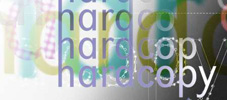On March 13th 2006 ANAT and the Creativity and Cognition Studios of the University of Technology, Sydney are bringing together a number of key thinkers and practitioners in the field of interdisciplinary publishing.

Image by Matt Oakes
The Hard Copy event, will address the question “How do we ‘make public’ creative interdisciplinary work?” The discussion will be led by Roger Malina – editor of Leonardo, the pre-eminent journal of art, science and technology, and supported by two leading Australian organisations engaged in interdisciplinary publishing Fibreculture, and RealTime.
To publish is to create public knowledge. New technologies for information storage and distribution are transforming the way we understand the concepts of both “public” and “knowledge”. Of course our current digital revolution is just one of a long line of such technological upheavals, but as Marshall McLuhan writes in The Gutenberg Galaxy:
“Now, in the electric age, the very instantaneous nature of co-existence among our technological instruments has created a crisis quite new in human history. Our extended faculties and senses now constitute a single field of experience, which demands that they become collectively conscious. Our technologies, like our private senses, now demand an interplay and ratio that makes rational co-existence possible. As long as our technologies were as slow as the wheel or the alphabet or money, the fact that they were separate, closed systems was socially and psychically supportable. This is not true now when sight and sound and movement are simultaneous and global in context.”[1]
The qualities of simultaneity and convergence in our information technologies call for a new approach, a new sensibility, for seizing the possibilities of contemporary ideas of “public” and of “knowledge”. The “closed system” thinking that separates disciplines from one another is ill suited to such a fast and fluid technological milieu. So the question for Hard Copy is not only how can the current paradigms of publishing evolve to deal with interdisciplinary practice, but also how can interdisciplinary thinking – as a sensibility – lead the way to new publishing paradigms.
A good place to start is the question of how interdisciplinary knowledge is produced and represented by academic research publishing. Collaborations across disciplines often create knowledge products in different domains, such as software, algorithms, artworks and theoretical writing. Digital publishing formats are well suited to this model of collaborative production as they can simultaneously present many forms of output, including audio-visual and interactive material alongside text. Online publications have the potential to make research available more easily, allowing knowledge to reach beyond the typically narrow readerships of specialised print journals.
An evolution in the systems of knowledge legitimation within academia, or more precisely within academic bureaucracy and funding, is needed to keep pace with our capacity to disseminate such a variety of forms so widely. The “publish or perish” climate of federal research funding in Australia makes the need for new thinking in this area urgent. So far the legitimacy and value of online publications have been measured by their ability to reproduce and compete with the gate-keeping measures of traditional academic print. The shortcomings of the dominant peer review system, a slow, discipline specific, normalising process, are well known even within traditional publishing paradigms.
The challenge for us at the Hard Copy workshop is to imagine new processes that could grow from the convergence of an interdisciplinary sensibility, which challenges narrow definitions of quality, relevance and expertise, with the potentially more open structures of current information technologies. How can we exploit the ability of networked media to sustain and represent the complexity and transversality of knowledge creation? What new models might emerge for navigating our way meaningfully through this complexity?
Moving towards more complex and open systems for representing knowledge challenges the distinction between a specialist and generalist public. As our technological means of knowledge distribution become more diffuse the publics they create become more amorphous and multidimensional. As Gillian Beer has argued, after 1928 radio produced a new idea of a public that was “far more intermixed, promiscuous and democratic than the book could cater for…. On radio, material for thought that had earlier pointed towards a particular audience with particular expertise now had to be rethought as “general knowledge.”[2]
In turn the interactive technology of the internet has created an active public, able to respond to and produce knowledge in a new kind of global public space. Structures like wikis and blogs have opened up straightforward, dynamic and collaborative ways to speak and write publicly. Their success has begun to dismantle the binary of producer/consumer.
The pervasive changes in the way we produce and consume information should be leading to a renaissance in participative critical discourse. But there seems to be some kind of lag in its arrival. Instead, in Australia there is a frequently invoked “crisis” in criticism, particularly around experimental and hybrid art practice (see reports from the Vital Signs Conference, Melbourne September 2005). The crisis is attributed to the lack of a market, due mostly to the indifference of the major newspapers and broadcasters. Can a broader conception of the public – not as consumers but as collaborators – allow us to think beyond the limitations of a market, and open the door to a vibrant climate of discussion beyond the hegemony of mainstream media?
So a more open and collaborative approach to the creation of public knowledge is the optimistic proposal on the table for discussion at Hard Copy. Meanwhile it is important to remember that innovations in information technology provoke reaction in the existing order. The history of publishing is full of moments when the devolution of knowledge through new technologies was met by the authorities with a regulatory contraction. So far the conflict around the emergence of digital technologies has been dominated by the discourse of ownership. Copyright law has struggled to assert itself in the fluid world of digital reproduction and circulation; there is no better example than the furious debate over Google’s Library Project, which seeks to transform the way we search through printed material by digitising and indexing millions of books from the world’s greatest libraries. The struggle to establish new notions of ownership continues, but it is joined ever more urgently by a challenge which is at once ancient and modern. At the start of the recently re-branded “Long War”, with the passing of vague and antiquated sedition laws in Australia, the terms of engagement are shifting in the realm of public knowledge. Freedom of expression and diversity of perspectives are rights we will have to fight for during the next decades and the form and nature of our publishing initiatives will play an important role.
Lizzie Muller
Lizzie Muller is a curator and writer working at the intersection of art, technology and science. She is currently researching a PhD on the audience experience of interactive art with the Creativity and Cognition Studios at the University of Technology, Sydney.
References
[1] Marshall McLuhan, The Gutenberg Galaxy: The Making of Typographic Man, Toronto: University of Toronto Press, 1962
[2] Gillian Beer, Wireless’: Popular Physics, Radio and Modernism in Cultural Babbage, Technology, Time and Intervention, 1996
Read More
http://www.creativityandcognition.com
http://www.realtimearts.net.au
http://www.mitpress2.mit.edu/e-journals/Leonardo
http://www.journal.media-culture.org.au
http://www.arts.usyd.edu.au/publications/philament/about.htm
 This work is licensed under a Creative Commons Attribution-NonCommercial-ShareAlike 2.5 Australia.
This work is licensed under a Creative Commons Attribution-NonCommercial-ShareAlike 2.5 Australia.






